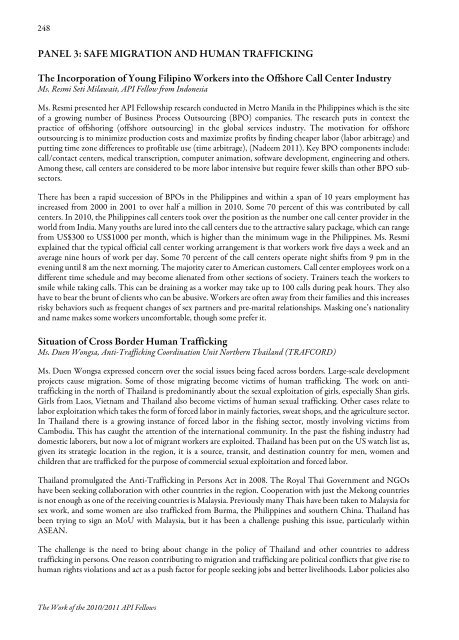Untitled - Api-fellowships.org
Untitled - Api-fellowships.org
Untitled - Api-fellowships.org
You also want an ePaper? Increase the reach of your titles
YUMPU automatically turns print PDFs into web optimized ePapers that Google loves.
248PANEL 3: SAFE MIGRATION AND HUMAN TRAFFICKINGThe Incorporation of Young Filipino Workers into the Offshore Call Center IndustryMs. Resmi Seti Milawait, API Fellow from IndonesiaMs. Resmi presented her API Fellowship research conducted in Metro Manila in the Philippines which is the siteof a growing number of Business Process Outsourcing (BPO) companies. The research puts in context thepractice of offshoring (offshore outsourcing) in the global services industry. The motivation for offshoreoutsourcing is to minimize production costs and maximize profits by finding cheaper labor (labor arbitrage) andputting time zone differences to profitable use (time arbitrage), (Nadeem 2011). Key BPO components include:call/contact centers, medical transcription, computer animation, software development, engineering and others.Among these, call centers are considered to be more labor intensive but require fewer skills than other BPO subsectors.There has been a rapid succession of BPOs in the Philippines and within a span of 10 years employment hasincreased from 2000 in 2001 to over half a million in 2010. Some 70 percent of this was contributed by callcenters. In 2010, the Philippines call centers took over the position as the number one call center provider in theworld from India. Many youths are lured into the call centers due to the attractive salary package, which can rangefrom US$300 to US$1000 per month, which is higher than the minimum wage in the Philippines. Ms. Resmiexplained that the typical official call center working arrangement is that workers work five days a week and anaverage nine hours of work per day. Some 70 percent of the call centers operate night shifts from 9 pm in theevening until 8 am the next morning. The majority cater to American customers. Call center employees work on adifferent time schedule and may become alienated from other sections of society. Trainers teach the workers tosmile while taking calls. This can be draining as a worker may take up to 100 calls during peak hours. They alsohave to bear the brunt of clients who can be abusive. Workers are often away from their families and this increasesrisky behaviors such as frequent changes of sex partners and pre-marital relationships. Masking one’s nationalityand name makes some workers uncomfortable, though some prefer it.Situation of Cross Border Human TraffickingMs. Duen Wongsa, Anti-Trafficking Coordination Unit Northern Thailand (TRAFCORD)Ms. Duen Wongsa expressed concern over the social issues being faced across borders. Large-scale developmentprojects cause migration. Some of those migrating become victims of human trafficking. The work on antitraffickingin the north of Thailand is predominantly about the sexual exploitation of girls, especially Shan girls.Girls from Laos, Vietnam and Thailand also become victims of human sexual trafficking. Other cases relate tolabor exploitation which takes the form of forced labor in mainly factories, sweat shops, and the agriculture sector.In Thailand there is a growing instance of forced labor in the fishing sector, mostly involving victims fromCambodia. This has caught the attention of the international community. In the past the fishing industry haddomestic laborers, but now a lot of migrant workers are exploited. Thailand has been put on the US watch list as,given its strategic location in the region, it is a source, transit, and destination country for men, women andchildren that are trafficked for the purpose of commercial sexual exploitation and forced labor.Thailand promulgated the Anti-Trafficking in Persons Act in 2008. The Royal Thai Government and NGOshave been seeking collaboration with other countries in the region. Cooperation with just the Mekong countriesis not enough as one of the receiving countries is Malaysia. Previously many Thais have been taken to Malaysia forsex work, and some women are also trafficked from Burma, the Philippines and southern China. Thailand hasbeen trying to sign an MoU with Malaysia, but it has been a challenge pushing this issue, particularly withinASEAN.The challenge is the need to bring about change in the policy of Thailand and other countries to addresstrafficking in persons. One reason contributing to migration and trafficking are political conflicts that give rise tohuman rights violations and act as a push factor for people seeking jobs and better livelihoods. Labor policies alsoThe Work of the 2010/2011 API Fellows
















